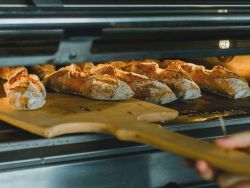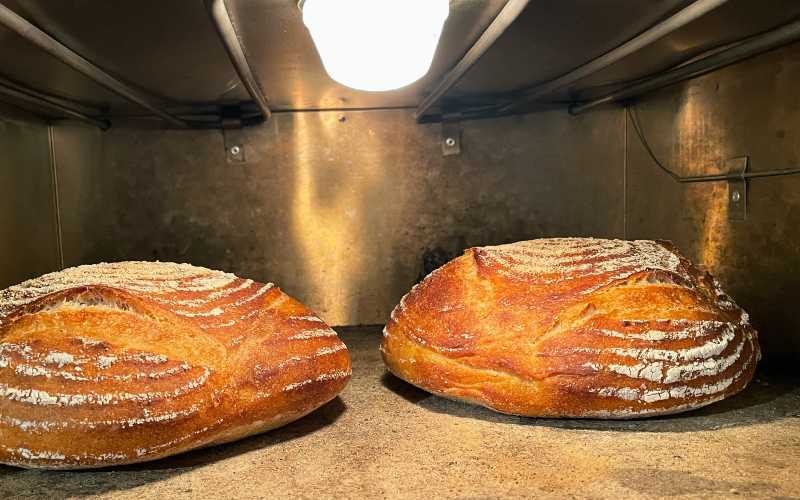
How Many Loaves Of Bread Can You Bake At Once?

Making bread in bigger batches is a great way to save time and money. How it works is that, instead of baking fresh loaves several times a week, you make a batch of bread and put a few in the freezer. Or, instead of eating them all yourself, you might want to make friends with your neighbours or make even bigger batches to sell your bread. So, how many loaves of bread can you bake at once? And when selling bread, how does the batch size affect the time and cost to make bread?
How many loaves can I fit in a domestic oven?
How many loaves you can bake at once depends on the size of your oven and how you are baking them. Most standard-sized ovens will fit one or two large loaves or 2-3 small ones at a time.
In a larger domestic oven, you can fit a few more. If you want to get yourself a custom baking stone you’ll be able to maximise the baking space in the oven. It’s possible to fit up to 3 large loaves and 5 small ones in a large oven.

There should be plenty of room for hot air to circulate in an oven. So don’t pack your bread too tightly when making bigger batches. Your loaves will expand outwards as well as upwards!
Domestic ovens are not as powerful as commercial ones. You can see how powerful your oven is by checking the number of watts it uses on the back of the unit.
Lower-powered ovens take longer to regain heat after the bread is loaded in. This means you’ll have to wait between bakes for the oven to recover. You’ll want to bake fewer items at a time too. You might be able to improve heat retention in a domestic oven by preheating lava rocks in the base of the chamber. The rocks soak up heat, meaning the oven takes longer to preheat properly but retains heat better when in use.
How many loaves can I bake at once with a Dutch oven?
Unless you have a large Dutch oven like a Challenger, you won’t be able to bake more than one or two loaves at a time with Dutch ovens. In a Challenger, it is possible to bake two small loaves at a time. If your oven is large enough, you can fit a second Dutch oven in. This strategy is fine for domestic use, but not economical if you are running a business.
How many baguettes can I bake at once in an oven?
Baguettes need high heat and plenty of air circulation during baking. A domestic oven will fit 3-4 baguettes at a time, provided they are short enough to fit in the oven! It’s hard to slide them into the oven from a peel as it’s such a small space, so you may prefer to use a baguette tray.
Do I need to change the temperature of the oven when baking multiple loaves?
You shouldn’t need to adjust the temperature of the oven when baking more than one loaf. However, loading lots of cold dough into a baking chamber will cool it down. You may want to increase the preheating temperature by 20-30 degrees to compensate for the expected heat loss.
Do I bake for longer when making multiple loaves?
Bread often takes a few extra minutes when making multiple loaves at a time. Depending on how powerful the oven is, the bread could need 2-10 extra minutes of baking. A powerful oven that maintains temperature well needs less adjustment.
What do I do if I can’t fit all the bread in the oven?
If you have too much bread ready to go in your oven, you will have to separate some and bake them in separate batches. To slow down the rise of the awaiting batches, put them in the fridge. Placing bread dough in the refrigerator slows the activity of the yeast. Alternatively, you might be curious to see if an extra 30 minutes of proofing benefits the bread. If so, keep them proofing!
Tips for baking several loaves at a time
If you are going to bake several loaves at once, here are my top tips:
Know your heat spots
Most ovens have areas where food cooks quicker than others, called heat spots. When making bigger batches, use the last 5-10 minutes of baking to flip the loaves around to ensure they are coloured equally.
Increase the preheating temperature
For domestic ovens, increase the preheat temperature. For more powerful commercial ovens, this is less of a problem. But by preheating 20-30 degrees higher than your baking temperature, you reduce the amount of heat lost when loading the oven.
Allow the oven to recover between bakes
After baking bread with a baking stone it will be cooler in the area where the bread was baked. To ensure your next bread receives the same amount of heat transfer from the baking stone, let the oven recover between bakes. This will aid your bread to receive the full power of oven spring and reduce the time the bread will spend in the oven.
The recovery time depends on the power of the oven. A good starting point is 5 minutes.
Bake for longer if they need it
If the bread has not browned by the end of the baking cycle, bake it for another 2-3 minutes and check again. Use this extra time to move your bread to the hotter areas of the oven to add more colour.
Allow plenty of space between the loaves
There should always be some airflow between bread in the oven. This allows warmth to be conducted into the bread as it bakes.
How many loaves can I cool at once?
Smart bakers reading this will also be considering how to cool all this freshly baked bread. You were thinking that, right? Anyway, cooling is an essential stage of making bread, but how long should you let bread cool down, and how best to do it when baking bigger batches?
Most types of bread will take around 2-3 hours to cool. To cope with cooling several loaves, you can opt for a layered cooling rack, improvise with cooling rack alternatives that you might have lying around your home, or you might have to settle for a rotation system where the hot loaves cool on a cooling rack until the next batch leaves the oven.
Frequently asked questions about baking several loaves of bread at once
If you’ve enjoyed this article and wish to treat me to a coffee, you can by following the link below – Thanks x

Hi, I’m Gareth Busby, a baking coach, head baker and bread-baking fanatic! My aim is to use science, techniques and 15 years of baking experience to help you become a better baker.
Table of Contents
- How many loaves can I fit in a domestic oven?
- How many loaves can I bake at once with a Dutch oven?
- How many baguettes can I bake at once in an oven?
- Do I need to change the temperature of the oven when baking multiple loaves?
- Do I bake for longer when making multiple loaves?
- What do I do if I can’t fit all the bread in the oven?
- Tips for baking several loaves at a time
- How many loaves can I cool at once?
- Frequently asked questions about baking several loaves of bread at once
Related Recipes
Related Articles
Keep up to date with the latest Articles, Recipes & Bread Baking info by joining my mailing list
Join The Weekly Bread Baker's Newsletter!
Latest Articles
Baking Categories
Disclaimer
Address
8 Woodland Avenue,
Worthing
West Sussex
BN13 3AF
UK








Leave a Reply